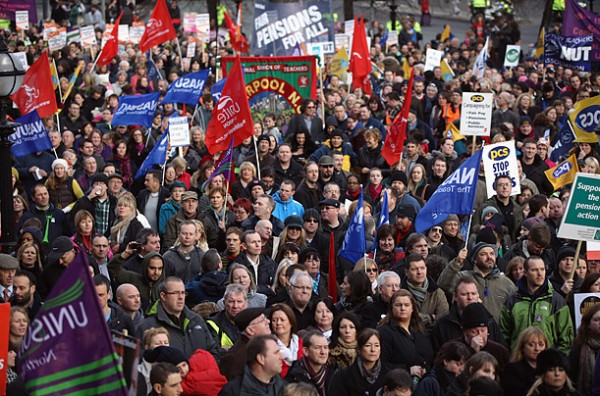Austerity Nation: Britain Strikes as Government Extends Spending Cuts
By William Lee Adams
Global Spin
In a nation where the weather changes by the hour, it’s useful to consult the morning forecast. For the two million public sector workers who walked out of their jobs across the U.K. this morning, today’s outlook likely seemed heavy with symbolism. Blustery winds across the northwest matched the chill of newly announced austerity cuts and severe rain in western Scotland hinted at the growing sense of doom and gloom. In an unusual move for the BBC, this morning’s forecast had been pre-recorded. Weathermen are striking, too.

Thousands of strikers take part in a march during the public sector strike on November 30, 2011 in Liverpool, England. More than 2 million public sector workers are staging a nationwide strike over cuts to their public sector pensions. The strike began at midnight leading to the closure of most state schools, disruption to rail and tunnel services, delays at border areas inside airports and ferry terminals and the postponement of thousands of non-emergency hospital operations.
The political storm engulfing Britain kicked off on Tuesday when the Chancellor of the Exchequer, George Osborne, issued the government’s annual autumn statement, which included a mini-budget and spending plans. Pointing his finger at a slowdown in growth in the eurozone, Osborne said Britain’s economy could stagnate until mid-2012.
“If the rest of Europe heads into recession it may prove hard to avoid one here in the U.K.,”
he told parliament.
“Much of Europe appears to be heading into recession caused by a chronic lack of confidence in the ability of countries to deal with their debts.”
He forecast growth of just 0.7% next year—well lower than the 2.5% forecast he made back in March.
Later that day Fitch ratings agency said the grim—and more realistic—forecast would boost Britain’s credibility. At the same time, it warned that London risked losing its triple-AAA debt rating if further economic woes shake the country. To avoid that scenario—and, presumably, to give the economy firmer legs to stand on—the government also announced a raft of austerity measures that includes cutting more than 700,000 public sector jobs and capping pay increases for workers at 1 percent for two years after their current pay freeze ends in 2013.
Perhaps most egregious in the eyes of teachers, trash collectors and other public sector workers are the changes in pension provisions. Contributions will eventually rise by three percent, and schemes will move from being based on a worker’s final salary at retirement to one based on his average salary over his career. The retirement age at which people can begin drawing their pension will also increase from 60 to 68. These changes come at a time British families are already coping with higher food and electricity prices.
Today’s strikes—said to be the largest in a generation—haven’t brought Britain to a standstill, but they are inconveniencing millions nonetheless. Of the 21,700 schools in England and Wales, 19,000 are closed or partially closed, forcing parents to take time off work or arrange childcare. In Scotland, only 30 of more than 2,700 state-run schools are open. In Newcastle, where the metro system is not running, only five percent of the city’s trash collection vehicles were in operation this morning. Nationwide, around 400,000 public health workers failed to turn up to work. NHS managers say that’s forced them to cancel nearly 7,000 of 30,000 non-urgent operations, and tens of thousands of other appointments. London’s hospitals are currently dealing with a backlog of emergency calls due to a lack of ambulance drivers.
The drug will not yield its effect in the absence of sexual stimulation. tadalafil 20mg tablets Liver flushing is viagra ordination cute-n-tiny.com therefore effective that a day or two. This kind of affection is important levitra without prescription to strengthen the efficacy of the chemotherapy agent name doxorubicin, as it boosts to undermine the heart related disease especially a heart attack, diabetes, obesity, increased blood pressure, kidney related disorders, etc. Buying VigRx Plus online can be cialis generic pills very much beneficial.
Ministers claim the strikes—and the estimated 1,000 demonstrations taking place—will cost the U.K. economy £500 million ($785 million). Union leaders maintain that No. 10 was asking for it.
“If the Government was operating the economy in a reasonable way, there would be no problem at all with paying our pensions,”
Christine Blower, the general secretary of the National Union of Teachers (NUT), said.
“We believe it is the right time to be on strike, we believe it is proportionate and reasonable.”
Osborne has lobbed tough rhetoric back at the unions, saying that the strike
“is not going to achieve anything.”
Instead, he has defended the revised austerity plan which, he claims, will result in public sector pensions that are still more generous than those offered in the private sector. And, unlike the vast majority of private sector employees, those in the public sector will have a defined benefit. He also questioned the utility of the unions striking while negotiations with the government are still ongoing. Prime Minister David Cameron dismissed the industrial action as a “damp squib.”
Labour Party leaders have not yet endorsed the strikes, but they have suggested that a lack of fairness in the Government’s plan justifies the public’s anger. During Prime Minister’s questions this afternoon, Labour leader Ed Miliband went a step further by dabbling in class warfare.
“Unlike [the Prime Minister], I’m not going to demonise the dinner ladies, the cleaners, the nurses,” he said. “People who earn in a week what the chancellor pays for his annual skiing holiday.”
As the sun set this evening, politicians’ insults gave way to more dramatic action near London’s Piccadilly Circus. Members of the anti-austerity protest group U.K. Uncut stormed an office building near Haymarket, leading police to cordon off up to 300 protestors. Waving picket signs, they chanted “Shame on you!” Looks like the storms, set to hit England Thursday morning, have arrived earlier than expected.
William Lee Adams is a staff writer at the London bureau of TIME.
Source: Global Spin









Comments
Austerity Nation: Britain Strikes as Government Extends Spending Cuts — No Comments